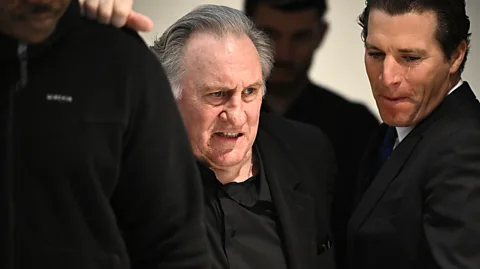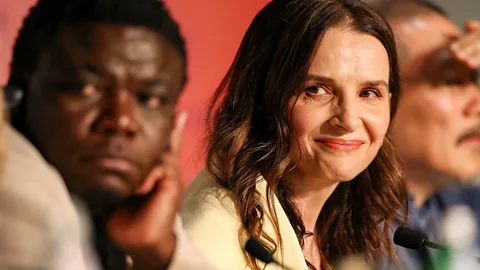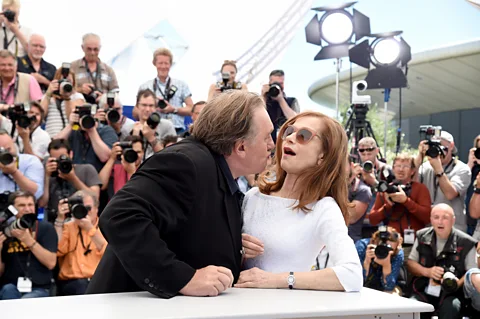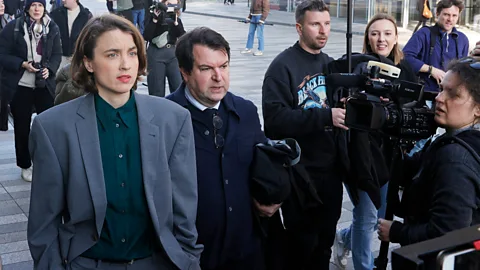'It represents a seismic change': What Gérard Depardieu's conviction means for France
 Getty Images
Getty ImagesYesterday, the French mega-star was found guilty of sexually assaulting two women on a film set. It's verdict which could have a big impact on the country's film industry.
It couldn't have been timed more dramatically if it had been written into a film script. The world's most famous film festival, in Cannes, began on the same day that Gérard Depardieu, one of the biggest film stars France has ever produced, was found guilty of sexually assaulting two women on the film set of a 2021 film, The Green Shutters, who described him groping them while using obscene language. "The giants of cinema are no longer untouchable," exclaimed one French news website, while another said that the news had "shaken up" the start of the iconic festival, from where I am currently reporting.
 Getty Images
Getty ImagesSeventy-six-year-old Depardieu is the veteran of around 200 films and TV productions. Famous in France since the late 1960s, he had international art house hits with films such as 1986's Jean de Florette. He became a global name as a result of a best actor Oscar nomination for a lavish French-language film production of Cyrano de Bergerac (1990), as well as the Hollywood romcom Green Card from the same year. Yesterday, Depardieu was given an 18-month suspended prison sentence, fined €29,000 (£24,430) and added to France's sex offenders register, but his lawyer said he will appeal the judgement.
Around 20 women have made allegations about Depardieu's improper behaviour in the past, but this is the first to come to trial, and the significance of the verdict cannot be overstated, according to writer Agnès C Poirier. "When a monument falls, it is always powerful and symbolic," she tells the BBC.
She adds that his reputation is "profoundly tarnished" but that "the French film industry sentenced him a long time ago. He hasn't shot a film in three years. His career is finished. He's still one of the greatest actors of the 20th Century, though we may now feel different when we watch his films."
The mood at Cannes
For many years, the larger-than-life figure of Depardieu has also been linked to the Cannes Film Festival. He won the best actor prize here for Cyrano de Bergerac, launching it on its Oscar journey, and also played a part behind the scenes; its director, Thierry Frémaux, admitted that a much-derided football film from 2014, United Passions, starring Depardieu, premiered at Cannes because of pressure from the actor. He was most recently seen in 2015 at the festival with Isabelle Huppert for the film Valley of Love (and was seen staging a mock kiss at the photocall, as pictured below).
Unsurprisingly, Cannes Jury President, Juliette Binoche, who has also starred opposite Depardieu, was asked for her thoughts on the importance of his conviction at yesterday's opening press conference.
"He is no longer sacred," she told journalists, a reference to the scale of Depardieu's power in the French film industry.
Eve Jackson, the Culture Editor at French news channel France 24, tells the BBC that Depardieu "has been revered as one of the sons of the Cannes Film Festival. And now that legacy is going to be called into question because it really was this festival that launched him into international stardom 35 years ago with Cyrano de Bergerac."
Last year's festival, anticipating Depardieu's forthcoming trial, was full of activity from France's own #MeToo movement, with French female film-makers using international cinema's most public platform to show films dealing with the subject of sexual abuse.
Actress Judith Godrèche, who had recently gone public with allegations of sexual assault by two film-makers, Benoît Jacquot and Jacques Doillon, premiered a short film called Moi Aussi, ("me too") featuring hundreds of victims of sexual abuse standing silently in the streets of Paris. Last July, both Jacquot and Doillon were interviewed by police in connection with the accusations, which they have denied.
 Getty Images
Getty ImagesCoralie Fargeat's Oscar winner, body horror The Substance, which explored, as she told the BBC at the time, her own "rage" about the sexual objectification of women of all ages.
This year, seven films in the main competition are by female directors. One of them, The Sound of Falling by German writer-director Mascha Schilinski, which premieres today, explores generational abuse of girls told through the story of one family. But it remains to be seen how many more films will address the topic of abuse during this festival.
Beyond the films, Jackson says the atmosphere feels different at the 2025 festival, due to some high-profile cases that have sent shockwaves across France. Chief among them, in December, Dominique Pelicot and 50 other men were convicted of the rape, attempted rape and sexual assault of of Pelicot's 72-year-old wife Gisèle Pelicot. In February, director Christophe Ruggia was convicted of sexually assaulting Portrait of a Lady on Fire actor Adèle Haenel when she was a child; Haenel publicly quit the film industry in 2023, accusing it of "general complacency" towards sexual predators. Benoît Jacquot has been charged with raping two actors, which he denies.
A wider shift in attitudes
"There's a big change that's taking place within the French film industry and you can feel it here at Cannes," Jackson says. "And I think the fall of Depardieu really does represent this seismic change in France, that's perhaps come later than in Hollywood and the rest of the world, but it is here now. Young actors are calling out wrongdoing on set more and more, and someone like Ruggia received a four-year prison sentence (two years of which were suspended) for what he did to Adèle Haenel. They may not be international names in the way Depardieu is, but they're very significant to France. This idea of power play on film sets from actors and directors is no longer acceptable."
More like this:
• The meaning behind Cannes' 'naked dress' ban
There's some way to go, however; last month a French Parliamentary report, led by French MP Sandrine Rousseau, found that abuse was "endemic" across the entire French entertainment industry, and that attitudes were "barely evolving" despite the #MeToo movement. The detailed report had 86 recommendations for change, including greater protections for child actors and the use of intimacy co-ordinators as standard for sex scenes in cinema, and theatre (as of December 2023, only four of them were reported as working across the whole of France, compared with 100 in the US entertainment industry).
Depardieu also had some high-profile defenders; President Macron said in 2024 that the actor "made France proud". Seventy-six-year-old actor Fanny Ardant is one of his most steadfast supporters – Depardieu was absent from the verdict making a film with her in the Azores yesterday – and she came to court to support him, alongside his Cyrano de Bergerac co-star Vincent Perez. Brigitte Bardot, a French film star of the 1950s and 60s, also publicly defended him.
 Getty Images
Getty ImagesBut Jackson points to a reaction to an event during the Depardieu trial, which she says is significant of a societal shift. She says there was condemnation when Depardieu's lawyer Jérémie Assous accused the actor's two female victims in the court case, a 54-year-old set dresser and a 34-year-old assistant director, of "hysteria", being "liars" and working for the cause of "rabid feminism".
"I think Depardieu is increasingly seen as from a different era and so are his lawyers," she says. "They were called sexist in the way they spoke to the plaintiffs, calling them feminists as if it was a bad thing. And it added to his troubles, because the judge called it out and imposed an extra fine [of €2,000] because of it. It highlights the generational shift that's happening in France. His supporters are actors from the older generation such as Ardant and Bardot."
A few days before Depardieu's conviction, the 90-year-old Bardot publicly called the actor a "genius" on French TV, and deplored that "talented people who touch the bottom of a girl are consigned to the deepest dungeon". But this kind of attitude is seen by the young as archaic, says Jackson, and they are less aware of his reputation as a great actor.
"For people over the age of perhaps 50 and 60, Depardieu evokes memories of being a great actor of a certain era, but I don't know how many younger people are interested in that story anymore," she says.
--
If you liked this story sign up for The Essential List newsletter, a handpicked selection of features, videos and can't-miss news, delivered to your inbox twice a week.
